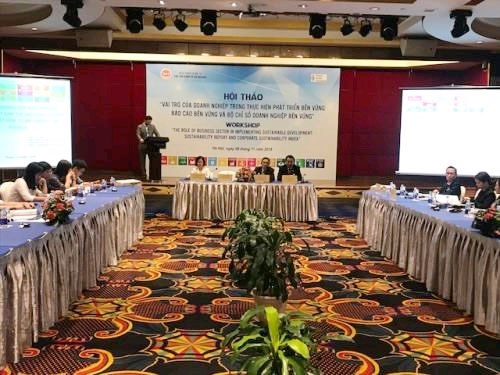Speaking at the event, Le Xuan Dinh, Editor-in-Chief of the Ministry of Planning and Investment's Economy and Forecast Review, the Government has issued a national action plan to implement the 2030 Agenda for Sustainable Development. Accordingly, all parties concerned have responsibilities for implementing the SDGs from the centrally-run to local authorities, including the National Assembly, the Government, ministries, agencies, social organisations, business community and the people.
To reach SDGs, Vietnam has also set up tasks to be implemented in 2017-20. They include completing a system of institutions on sustainable development and improve the effectiveness of State management on sustainable development, he said.
    |
 |
|
Experts gathered at a workshop in Hanoi on November 8 to discuss measures to raise the role and responsibility of businesses in realising sustainable development goals (SDGs) |
However, he noted that during the implementation process, the country has faced many challenges regarding social and environmental matters, climate change response, financial sources, connectivity among agencies and sectors, and statistical capacity.
According to Pham Quang Vinh, Deputy General Secretary of the Vietnam Chamber of Commerce and Industry (VCCI), to achieve SDGs, Vietnam will carry out the national action plan to promote sustainable economic growth together with implementing social justice and protection of the ecological environment, as well as to effectively manage and use natural resources and respond to climate change.
He said according to a survey conducted by an agency under the UN, 80 percent of surveyed enterprises in Vietnam know 17 goals of the country’s sustainable development goals (SDGs) so they have put the goals at their business and competitive strategies. Meanwhile, 63 percent of the enterprises have implemented programmes of sustainable development, such as responding to climate change.
In previous years, enterprises participating in the survey on sustainable development were mainly foreign-invested enterprises while now, there are more local enterprises joining this survey.
Since 2015, Vietnam has had a corporate sustainability index (CSI), with 131 indicators to assess economic, social and environmental aspects. The indicators have become an important tool for enterprises to set up corporate governance strategies.
There are now indicators for seafood processing enterprises and by the end of this year, there will be more for footwear and leather bags. Indicators for other sectors are still being established, Vinh said.
Source: VNA